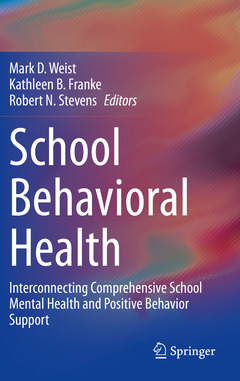School Behavioral Health, 1st ed. 2020 Interconnecting Comprehensive School Mental Health and Positive Behavior Support
Coordonnateurs : Weist Mark D., Franke Kathleen B., Stevens Robert N.

This book examines the prevalence of emotional and behavioral problems in youth and the implications of little or low-quality mental health services available for them. It describes aspects of Positive Behavioral Interventions and Supports (PBIS) and school mental health (SMH) that work together to form a comprehensive service delivery model called the Interconnected Systems Framework (ISF). The term school behavioral health (SBH) is used to describe SMH and PBIS working together, as in the ISF. The book examines perspectives of key stakeholders through a series of research forums, during which participants identified critical themes for the advancement of SBH in South Carolina and the southeast region of the United States. Chapters address key themes of school behavioral health from these forums, such as collaboration, schoolwide approaches, quality of services, and support for specific populations, including military families and youth involved in the juvenile justice and child welfare systems. The book addresses barriers to providing behavioral health services at school as well as recommendations from key stakeholders for advancing SBH along these critical dimensions.
This volume is a must-have resource for researchers, professors, and graduate students as well as practitioners, clinicians, and therapists across such interrelated disciplines as clinical child and school psychology, educational policy and politics, social work, public health, school counseling, family studies, juvenile justice, child and adolescent psychiatry, and child welfare and well-being services.
Chapter 1: Overview of School Behavioral Health.- Chapter 2: Collaboration and School Behavioral Health.- Chapter 3: Schoolwide Approaches and Student Behavioral Health.- Chapter 4: Cultural Humility and School Behavioral Health.- Chapter 5: Quality of Services and School Behavioral Health.- Chapter 6: Implementation Support and School Behavioral Health.- Chapter 7: Juvenile Justice and School Behavioral Health.- Chapter 8: Child Welfare and School Behavioral Health.- Chapter 9: Military Families and School Behavioral Health.
Mark D. Weist, Ph.D., received a doctorate in clinical psychology from Virginia Tech in 1991 and is currently a Professor in the Department of Psychology at the University of South Carolina. He was on the faculty of the University of Maryland School of Medicine (UMSM) for 19 years, where he helped found and direct the Center for School Mental Health, one of two national centers providing leadership to the advancement of school mental health (SMH) policies and programs in the United States. He has led several federally funded research grants, advised national research and policy oriented committees, and testified before Congress and presented to the President’s New Freedom Commission on Mental Health. He helped found the School Mental Health International Leadership Exchange. Dr. Weist has edited 12 books and published and presented widely in the SMH field and in the areas of positive behavior support, trauma, violence and youth, evidence-based practice, and cognitive behavioral therapy.
Kathleen Franke, Ph.D., BCBA, is a licensed psychologist and Board Certified Behavior Analyst. She currently serves as the Director of Psychological Services at The Unumb Center for Neurodevelopment. Dr. Franke obtained her doctorate in school psychology at the University of South Carolina in 2018, and she completed her doctoral internship at the Kennedy Krieger Institute at the Johns Hopkins University School of Medicine in Baltimore, Maryland. She completed her postdoctoral fellowship at the Autism Academy of South Carolina and the University of South Carolina. At the University of South Carolina, she served as a member of the School Behavioral Health Team, where she conducted and disseminated research regarding the provision of school behavioral health services.
Robert N. Stevens, Ph.D., received his doctorate from Florida State University with an emphasis in behavioral statistics. He has 40 years of experience in education as a teacher,
Describes ISF (Interconnected Systems Framework), a service delivery model combining Positive Behavior Interventions and Supports (PBIS) and School Mental Health (SMH)
Examines ISF use for youth with emotional and behavioral problems
Explores service delivery for specific populations (e.g., youth in military families, juvenile justice, child welfare)
Addresses barriers to providing behavioral health services at school
Date de parution : 02-2022
Ouvrage de 133 p.
15.5x23.5 cm
Disponible chez l'éditeur (délai d'approvisionnement : 15 jours).
Prix indicatif 137,14 €
Ajouter au panierDate de parution : 02-2021
Ouvrage de 133 p.
15.5x23.5 cm
Disponible chez l'éditeur (délai d'approvisionnement : 15 jours).
Prix indicatif 137,14 €
Ajouter au panierThèmes de School Behavioral Health :
Mots-clés :
Academic achievement and student well-being; At-risk students and behavioral interventions; Child welfare system and school behavioral health; Cultural responsiveness and school mental health; Families and school mental health; Family-school partnerships and school success; Fidelity of implementation and school mental health; Interconnected Systems Framework (ISF) and SBH; Juvenile justice; school behavioral health; Military families and school mental health; Multitiered systems of support and PBIS; Parent-teacher collaboration and student well-being; Peers and school behavioral health; Positive Behavior Interventions and Supports (PBIS); Response to Intervention (RtI) and student success; School behavioral health (SBH) and student well-being; School mental health and behavioral assessments; School mental health service models and delivery; School success and positive behavior support; Student engagement and school behavioral health



